牛津译林版英语七年级下Unit 5 Amazing things ntegratedskills&studyskill第四课时课件(23张PPT无素材)
文档属性
| 名称 | 牛津译林版英语七年级下Unit 5 Amazing things ntegratedskills&studyskill第四课时课件(23张PPT无素材) |
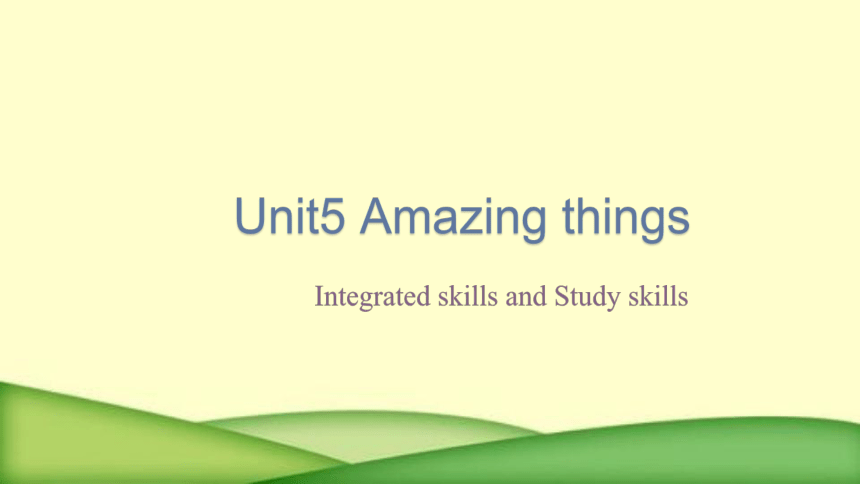
|
|
| 格式 | zip | ||
| 文件大小 | 6.4MB | ||
| 资源类型 | 教案 | ||
| 版本资源 | 牛津译林版 | ||
| 科目 | 英语 | ||
| 更新时间 | 2022-02-09 00:00:00 | ||
图片预览

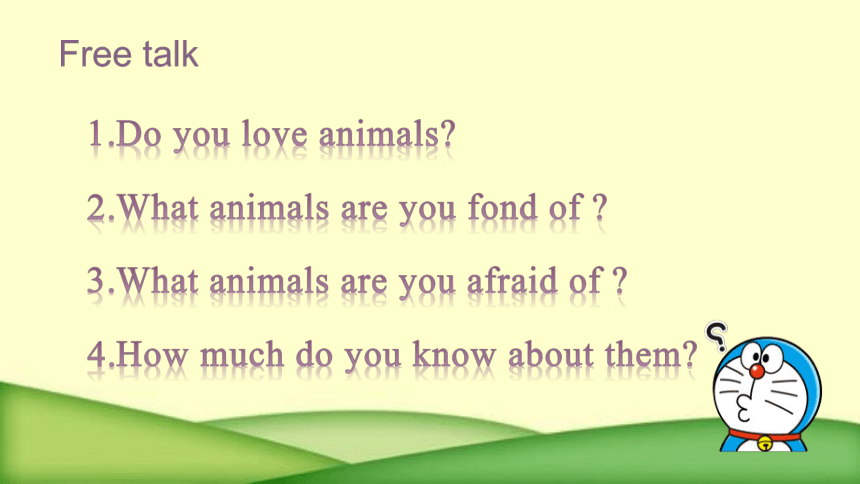
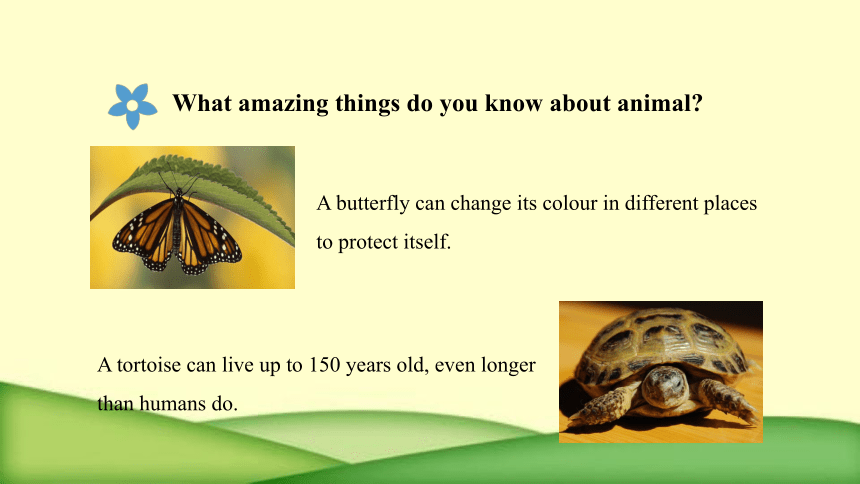
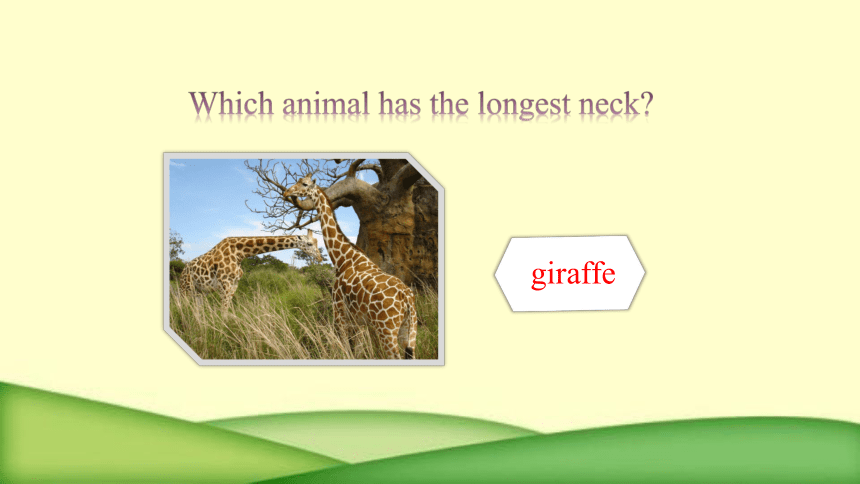
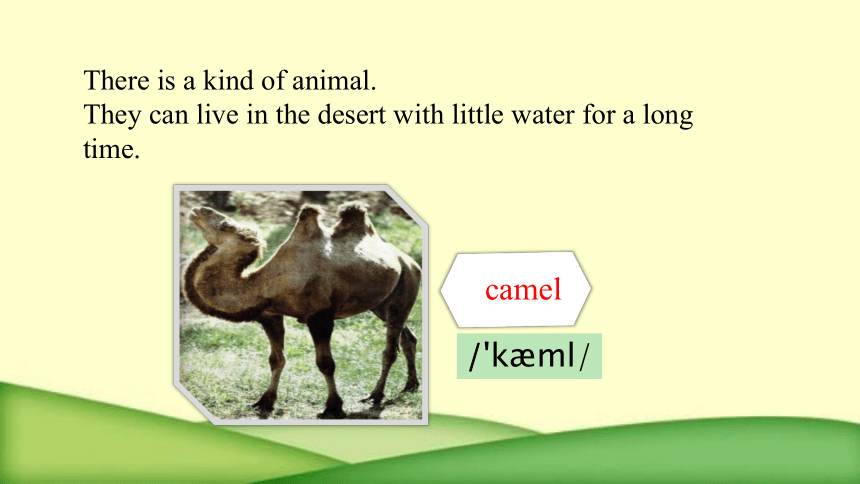
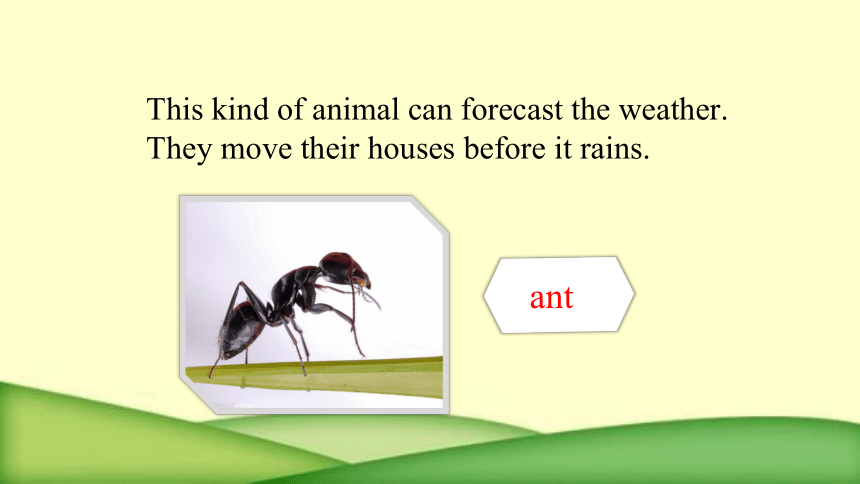
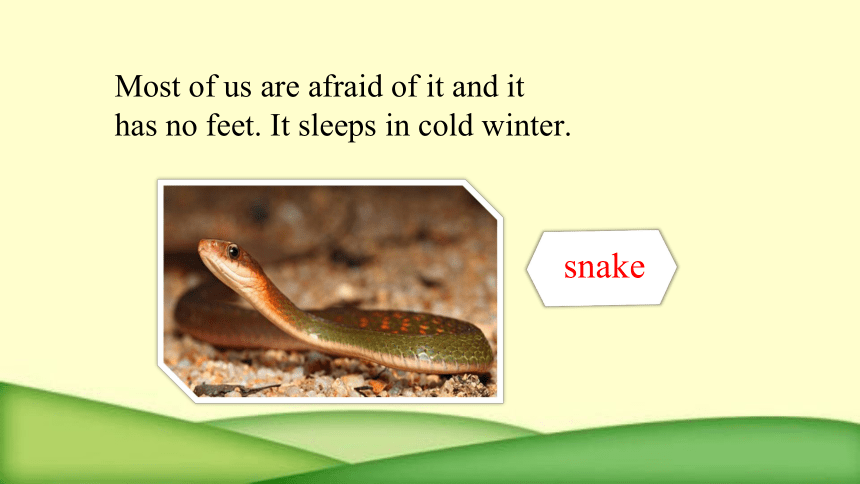
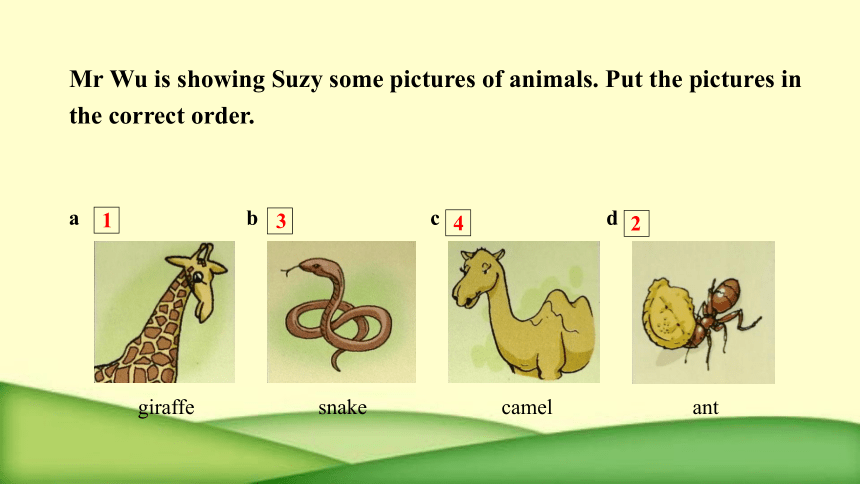
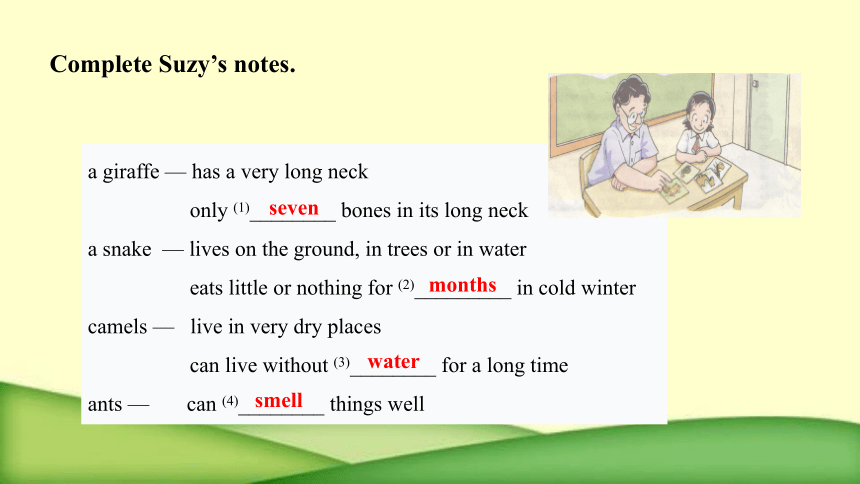
文档简介
(共23张PPT)
Unit5 Amazing things
Integrated skills and Study skills
Do you love animals
What animals are you fond of
What animals are you afraid of
How much do you know about them
Free talk
A butterfly can change its colour in different places to protect itself.
A tortoise can live up to 150 years old, even longer than humans do.
What amazing things do you know about animal
Which animal has the longest neck
giraffe
There is a kind of animal.
They can live in the desert with little water for a long time.
camel
/'k ml/
This kind of animal can forecast the weather. They move their houses before it rains.
ant
Most of us are afraid of it and it
has no feet. It sleeps in cold winter.
snake
Mr Wu is showing Suzy some pictures of animals. Put the pictures in the correct order.
a b c d
1
giraffe snake camel ant
3
4
2
a giraffe — has a very long neck
only (1)________ bones in its long neck
a snake — lives on the ground, in trees or in water
eats little or nothing for (2)_________ in cold winter
camels — live in very dry places
can live without (3)________ for a long time
ants — can (4)________ things well
Complete Suzy’s notes.
water
months
seven
smell
Help Suzy finish the thank- you letter to Mr Wu.
Dear Mr Wu,
Thank you for your help.
I know more about animals now. Some animals are really interesting.
The giraffe has a very long neck, but I was surprised to know that there are (1)_______________ in it. It is also amazing that a snake (2)__________________ in cold winter. Camels live in very dry places, and it is interesting that they (3)____________________ for a long time. I also know that we need to keep our house clean—ants (4)___________________.
Now I am not afraid of animals any more. I would like to learn more about them.
Suzy
only seven bones
eats little or nothing
can live without water
can smell things well
Speak up: That's really amazing!
Amy: Do you know about any amazing things, Simon
Simon: Yes. I heard of a young man. He travelled around over 80 countries by bicycle.
Amy: That's cool! What amazing things do you know, Millie
Millie: I read about a man the other day. He can write with one hand and draw
with the other at the same time.
Simon: That's really amazing! What about you, Peter Do you know any
amazing things
Peter: I learnt about an artist. He can draw 3- D pictures with chalk.
Simon: That's really great!
Language points
.can live without water for a long time没有水可以存活很长一段时间without 介词,意为“没有”,其后跟名词、代词或动名词。
without后跟人称代词作宾语时,用其宾格形式。Most plants can't grow without sunshine.大多数植物没有阳光就不能生长。I went to school without eating breakfast.我没吃早饭就去上学了。中考●链接---- Reading is a good way to spend the time on the plane.----That's true. I never go travelling_______a book.A. without B. from C. on D. about
2.. Now I am not afraid of animals any more.现在我不再害怕动物了。1 )be afraid of 意为“害怕....,其后常跟名词、代词或动词-ing形式。My little sister is always afraid of dogs.我的妹妹一直怕狗。I'm afraid of failing the exam.我担心考试不及格。[拓展] be afraid to do sth.意为“不敢去做某事”。I'm afraid to go out alone at night.我不敢夜里独自出去。
(2 ) not... any more 意为“不再,再也不”相当于no more。
not用在系动词be、助动词或情态动词之后,any more位于句末。I'm not a little girl any more.我不再是一个小女孩了。 With this book, students won't be afraid of learning English any more.有了这本书,学生们将不再害怕学习英语了。
3.I heard of a young man.我听说过一个年轻人。hear of意为“听说, 知道”,相当于hear about,表示间接听说。Did you hear of/about Tom 你听说过汤姆吗 I heard of about the news the day before yesterday.我前天听说了这个消息。注意:hear from意为“收到....的来信”。I often hear from Tom.我经常收到汤姆的来信。
4.l read about a man the other day.前几天我读了关于一个人的故事。
the other day 意为.那天,前几天”,是一般过去时的时间状语。They met Mr Li the other day.前几天他们遇到了李先生,
5. He can write with one hand and draw with the other at the same time.他可以用一-只手写字,并同时用另一只手画画。at the same time 意为“同时”Lily and Tina got to the finishing line at the same time.莉莉和蒂娜同时达到终点线。6.He can draw 3-D pictures with chalk.他能用粉笔画立体画。chalk 此处用作不可数名词,意为“粉笔”,其数量的表达常借助于piece (块,....
a piece of chalk“一支粉笔”粉笔” some pieces of chalk“几支” Would you like to get some chalk for me 你愿意给我拿些粉笔吗 Yes,I'd like to.当然,我愿意。
How do you pronounce the following endings
/t/ /d/ /Id/
danced played hated
helped lived needed
talked answered visited
stopped carried shouted
A
How do you pronounce the endings of these words write /t/,/d/ or / d/ in the blanks.
1. listened ______ 2. liked ______ 3. wanted ______
4. hoped ______ 5. started ______ 6. chatted ______
7. finished ______ 8. passed ______ 9. stopped ______
10. raised ______ 11. walked ______ 12. turned ______
/d/
/d/
/d/
/t/
/ d/
/t/
/ d/
/ d/
/t/
/t/
/t/
/t/
B
Pay attention to the different pronunciations of the -ed ending.
Millie: Sandy, you're late. The museum closed just a minute ago.
Sandy: Sorry. My grandma visited us this afternoon, so I stayed at home and talked to her.
Kitty: That's OK.
Sandy: I hope you enjoyed your day. What did you do
Millie: We watched a short film. It showed a lot of amazing things in the world.
Kitty: Then we played some amazing games. It was fun! We're going to come here again next weekend.
Sandy: Let me come with you then!
/d/
/ d/
/t/
/d/
/t/
/d/
C
—Mum, could you wash the clothes for me
—Sorry, Kate, you are not a child __________. You should do what you can.
A. no more B. any more C. some more D. no longer
2. Thank you for ________ me. I can’t finish the work so early ____ your help.
help; with B. helping; with
C. helping; without D. help; without
3. ______ you afraid of _____ late for school
A. Are; be B. Do; be C. Are; being D. Do; being
4. I heard ___________my sister last week. So I must write back to her.
A. of B. from C. about D. for
Chose the right answers
—Mum, could you wash the clothes for me
—Sorry, Kate, you are not a child __________. You should do what you can.
A. no more B. any more C. some more D. no longer
2. Thank you for ________ me. I can’t finish the work so early ____ your help.
help; with B. helping; with
C. helping; without D. help; without
3. ______ you afraid of _____ late for school
A. Are; be B. Do; be C. Are; being D. Do; being
4. I heard ___________my sister last week. So I must write back to her.
A. of B. from C. about D. for
Chose the right answers
B
C
C
B
thank you
Unit5 Amazing things
Integrated skills and Study skills
Do you love animals
What animals are you fond of
What animals are you afraid of
How much do you know about them
Free talk
A butterfly can change its colour in different places to protect itself.
A tortoise can live up to 150 years old, even longer than humans do.
What amazing things do you know about animal
Which animal has the longest neck
giraffe
There is a kind of animal.
They can live in the desert with little water for a long time.
camel
/'k ml/
This kind of animal can forecast the weather. They move their houses before it rains.
ant
Most of us are afraid of it and it
has no feet. It sleeps in cold winter.
snake
Mr Wu is showing Suzy some pictures of animals. Put the pictures in the correct order.
a b c d
1
giraffe snake camel ant
3
4
2
a giraffe — has a very long neck
only (1)________ bones in its long neck
a snake — lives on the ground, in trees or in water
eats little or nothing for (2)_________ in cold winter
camels — live in very dry places
can live without (3)________ for a long time
ants — can (4)________ things well
Complete Suzy’s notes.
water
months
seven
smell
Help Suzy finish the thank- you letter to Mr Wu.
Dear Mr Wu,
Thank you for your help.
I know more about animals now. Some animals are really interesting.
The giraffe has a very long neck, but I was surprised to know that there are (1)_______________ in it. It is also amazing that a snake (2)__________________ in cold winter. Camels live in very dry places, and it is interesting that they (3)____________________ for a long time. I also know that we need to keep our house clean—ants (4)___________________.
Now I am not afraid of animals any more. I would like to learn more about them.
Suzy
only seven bones
eats little or nothing
can live without water
can smell things well
Speak up: That's really amazing!
Amy: Do you know about any amazing things, Simon
Simon: Yes. I heard of a young man. He travelled around over 80 countries by bicycle.
Amy: That's cool! What amazing things do you know, Millie
Millie: I read about a man the other day. He can write with one hand and draw
with the other at the same time.
Simon: That's really amazing! What about you, Peter Do you know any
amazing things
Peter: I learnt about an artist. He can draw 3- D pictures with chalk.
Simon: That's really great!
Language points
.can live without water for a long time没有水可以存活很长一段时间without 介词,意为“没有”,其后跟名词、代词或动名词。
without后跟人称代词作宾语时,用其宾格形式。Most plants can't grow without sunshine.大多数植物没有阳光就不能生长。I went to school without eating breakfast.我没吃早饭就去上学了。中考●链接---- Reading is a good way to spend the time on the plane.----That's true. I never go travelling_______a book.A. without B. from C. on D. about
2.. Now I am not afraid of animals any more.现在我不再害怕动物了。1 )be afraid of 意为“害怕....,其后常跟名词、代词或动词-ing形式。My little sister is always afraid of dogs.我的妹妹一直怕狗。I'm afraid of failing the exam.我担心考试不及格。[拓展] be afraid to do sth.意为“不敢去做某事”。I'm afraid to go out alone at night.我不敢夜里独自出去。
(2 ) not... any more 意为“不再,再也不”相当于no more。
not用在系动词be、助动词或情态动词之后,any more位于句末。I'm not a little girl any more.我不再是一个小女孩了。 With this book, students won't be afraid of learning English any more.有了这本书,学生们将不再害怕学习英语了。
3.I heard of a young man.我听说过一个年轻人。hear of意为“听说, 知道”,相当于hear about,表示间接听说。Did you hear of/about Tom 你听说过汤姆吗 I heard of about the news the day before yesterday.我前天听说了这个消息。注意:hear from意为“收到....的来信”。I often hear from Tom.我经常收到汤姆的来信。
4.l read about a man the other day.前几天我读了关于一个人的故事。
the other day 意为.那天,前几天”,是一般过去时的时间状语。They met Mr Li the other day.前几天他们遇到了李先生,
5. He can write with one hand and draw with the other at the same time.他可以用一-只手写字,并同时用另一只手画画。at the same time 意为“同时”Lily and Tina got to the finishing line at the same time.莉莉和蒂娜同时达到终点线。6.He can draw 3-D pictures with chalk.他能用粉笔画立体画。chalk 此处用作不可数名词,意为“粉笔”,其数量的表达常借助于piece (块,....
a piece of chalk“一支粉笔”粉笔” some pieces of chalk“几支” Would you like to get some chalk for me 你愿意给我拿些粉笔吗 Yes,I'd like to.当然,我愿意。
How do you pronounce the following endings
/t/ /d/ /Id/
danced played hated
helped lived needed
talked answered visited
stopped carried shouted
A
How do you pronounce the endings of these words write /t/,/d/ or / d/ in the blanks.
1. listened ______ 2. liked ______ 3. wanted ______
4. hoped ______ 5. started ______ 6. chatted ______
7. finished ______ 8. passed ______ 9. stopped ______
10. raised ______ 11. walked ______ 12. turned ______
/d/
/d/
/d/
/t/
/ d/
/t/
/ d/
/ d/
/t/
/t/
/t/
/t/
B
Pay attention to the different pronunciations of the -ed ending.
Millie: Sandy, you're late. The museum closed just a minute ago.
Sandy: Sorry. My grandma visited us this afternoon, so I stayed at home and talked to her.
Kitty: That's OK.
Sandy: I hope you enjoyed your day. What did you do
Millie: We watched a short film. It showed a lot of amazing things in the world.
Kitty: Then we played some amazing games. It was fun! We're going to come here again next weekend.
Sandy: Let me come with you then!
/d/
/ d/
/t/
/d/
/t/
/d/
C
—Mum, could you wash the clothes for me
—Sorry, Kate, you are not a child __________. You should do what you can.
A. no more B. any more C. some more D. no longer
2. Thank you for ________ me. I can’t finish the work so early ____ your help.
help; with B. helping; with
C. helping; without D. help; without
3. ______ you afraid of _____ late for school
A. Are; be B. Do; be C. Are; being D. Do; being
4. I heard ___________my sister last week. So I must write back to her.
A. of B. from C. about D. for
Chose the right answers
—Mum, could you wash the clothes for me
—Sorry, Kate, you are not a child __________. You should do what you can.
A. no more B. any more C. some more D. no longer
2. Thank you for ________ me. I can’t finish the work so early ____ your help.
help; with B. helping; with
C. helping; without D. help; without
3. ______ you afraid of _____ late for school
A. Are; be B. Do; be C. Are; being D. Do; being
4. I heard ___________my sister last week. So I must write back to her.
A. of B. from C. about D. for
Chose the right answers
B
C
C
B
thank you
